#economic equality
Text
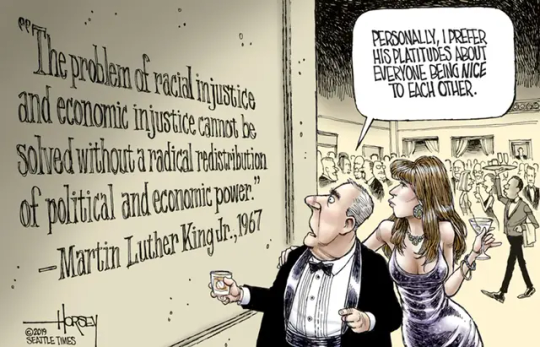
MLK at 95.
January 15, 2024
ROBERT B. HUBBELL
Martin Luther King, Jr. was born 95 years ago on January 15, 1929. As a Baptist minister, he advocated non-violence while promoting civil rights. He spoke for the poor, the oppressed, and the disenfranchised. While he was imprisoned in a Birmingham jail for protesting segregation, he responded to eight white ministers who had criticized him for participating in protests that they described as “unwise and untimely.”
Dr. King’s famous reply to the white ministers explained why he traveled to Birmingham from Atlanta to protest:
I cannot sit idly by in Atlanta and not be concerned about what happens in Birmingham. Injustice anywhere is a threat to justice everywhere. We are caught in an inescapable network of mutuality, tied in a single garment of destiny. Whatever affects one directly affects all indirectly. Never again can we afford to live with the narrow, provincial outside agitator" idea. Anyone who lives inside the United States can never be considered an outsider.
While Dr. King was keenly aware of the racism that served as the understructure of the Christian church in the old South, he would be shocked by the virulent, mean-spirited, anti-Christian message that animates many (not all) evangelical congregations in America today. They form the backbone of Donald Trump's support in Iowa and beyond. They have adopted Trump's message that treats the poor, oppressed, and disenfranchised as “outsiders” and “others” who do not belong in America.
Over the last several days, we have learned that members of the Texas National Guard physically blocked federal Border Patrol agents from responding to reports of immigrants in distress in the Rio Grande. The bodies of a mother and two children were later recovered from the river in the area where immigrants were reported to be in distress.
Texas, of course, denies that its cruel actions caused the drownings—a denial that should be viewed skeptically from a state whose governor—Greg Abbott—recently commented Texas troopers could not shoot immigrants crossing the border because the troopers would be charged with murder by the Biden administration. Texas governor criticized after comment about shooting migrants | The Texas Tribune.
Similar animus underlies the recent comments of Mississippi Governor Tate Reeves, who withdrew Mississippi from a federal program to provide food to school children during summer breaks. Governor Reeves said Mississippi withdrew from the program to fight “attempts to expand the welfare state.”
Blocking efforts to rescue a drowning mother and her children? Regretting the inability to shoot immigrants because it would be murder? Denying food to poor children out of spite? Who are these people? How do they look at themselves in the mirror?
Ninety-five years after Dr. King’s birth and fifty-five years after his death, it is difficult to believe that people who identify as upstanding members of the Christian church can support such actions.
Another section from Dr. King’s Letter from a Birmingham Jail is relevant to this moment in our nation’s history:
But the judgment of God is upon the church as never before. If the church of today does not recapture the sacrificial spirit of the early church, it will lose its authentic ring, forfeit the loyalty of millions, and be dismissed as an irrelevant social club with no meaning for the twentieth century. I meet young people every day whose disappointment with the church has risen to outright disgust.
Dr. King’s words were prophetic. See Pew Research (10/17/19) In U.S., Decline of Christianity Continues at Rapid Pace.
And, of course, as Dr. King recognized, “there are some notable exceptions” among church leaders who supported his work—just as there are exceptions today. Several readers have recommended Faithful America as an antidote to Christian nationalism. The organization’s helpful FAQ page explains why “Christian nationalism” is not Christian. See Resisting Christian Nationalism: FAQ + Resources | Faithful America.
On this day commemorating Dr. Martin Luther King Jr.’s birth, we can see how far we have come—and how much further we must go. He didn’t despair. Neither should we.
Robert B. Hubbell Newsletter
#MLK#David Horsey#political cartoons#Martin Luther King Jr#justice#equality#economic equality#Robert B. Hubbell#Robert b. Hubbell newsletter
488 notes
·
View notes
Text



Seeing younger folks discover Tracy Chapman…💙
“Don’t you know, were talkin’ about a revolution that sounds (like a whisper)
Don’t you know, were talkin’ about a revolution that sounds (like a whisper)
While they’re, standing in the welfare lines
Crying at the doorsteps of those Armies of Salvation
Wasting time, in the unemployment lines
Sitting around, waiting for a promotion
Don’t you know, were talkin’ about a revolution that sounds (like a whisper)
Poor people gonna rise up, and get their share
Poor people gonna rise up, and take what’s theirs
Don’t you know ya better run run run run run run run run run run run run
Oh, I said ya better run run run run run run run run run run run run
‘Cos finally the tables are starting to turn, talkin’ bout a revolution
Yes, finally the tables are starting to turn, talkin’ bout a revolution
Oh no, talkin’ bout a revolution
Oh, while they’re,
Standing in the welfare lines
Crying at the doorsteps of those Armies of Salvation
Wasting time, in the unemployment lines
Sitting around, waiting for a promotion
Don’t you know, were talkin’ about a revolution that sounds (like a whisper)
And finally the tables are starting to turn, talkin’ bout a revolution
Yes, finally the tables are starting to turn, talkin’ bout a revolution
Oh no, talkin’ bout a revolution
Oh no, talkin’ bout a revolution
Oh no”
19 notes
·
View notes
Text
This Really Is The Reason Why MLK Smiling In That Picture | The G.A.B. (Meme Time)
Full Show On The YouTube (Kamal Johnson Network). Link Below
YT Link
https://youtu.be/K5a687tZG4E?si=eyQs9hEGcG20s55G via YouTube
Podcast Links
iHeart: https://www.iheart.com/podcast/338-the-gab-101916901/episode/martin-luther-king-jr-dream-was-143505420/
Spotify: https://open.spotify.com/episode/2H8H1VrWPjZutaJzPIEjc6?si=5662ba1a0ba54b51
Apple Podcast: https://podcasts.apple.com/us/podcast/the-g-a-b/id1547660066?i=1000641918180
Podpage: https://www.podpage.com/the-gab/
@youtube @twitch @bet @revolttv @sony @warnerbrosentertainment @iheartradio @therokuchannel @starz @hbomaxes @showtimenetworks @hulu @netflix @comedycentral @appletv @vicemag @vicenews @siriusxm @applepodcasts
#mlk#martin luther king jr#memes#smile#equality#economics#economic equality#jokes#lol#comedy#funny#fyp#for your page#black twitter#white people#black people#black excellence#black show#black podcast#black owned#twitch#youtube channel#comedy videos#funny videos#viral video#black news channel#news#news update#news show
0 notes
Link
#Puerto Rico#Contextomy#Economic#Economic Equality#equality#Gender-based violence#International Violence Against Women Day#Law 74#Socioeconomic
0 notes
Text
What's better to admire than money?
I mean, why money? Money’s just a symbol of power; it’s not the power itself. We kinda rely on it, but we’re still around even when we’re broke.The weird thing about money worship is that it’s not really about what you can buy; it’s treated like some sort of deity.If money were a god, what would it offer? Would it give us fame, fortune, happiness, or just some peace of mind?Are rich folks…

View On WordPress
#citizen empowerment#collective well-being#community support#cooperative economics#democratic socialism#economic equality#education access#environmental sustainability#equitable distribution#equitable opportunities#fairness#government intervention#grassroots movements#inclusive policies#income equity#people&039;s power#progressive taxation#progressive values#public welfare#social justice#social reforms#social safety nets#solidarity#universal healthcare#wealth gap reduction#wealth redistribution#wealth sharing#wealth taxation#worker&039;s rights
1 note
·
View note
Text
Exploring the Concept of Digital Socialism: Advancements, Possibilities, and Intersection with AI, Cybersecurity and Data Protection
Digital socialism is a concept that has gained attention in recent years, as advancements in technology and the internet have opened up new possibilities for promoting greater economic equality, democratic participation, and collective ownership in society. Combining elements of socialism with digital tools such as open-source collaboration, decentralized networks, and digital commons, digital…

View On WordPress
#AI#AI for social good#AI governance#Artificial Intelligence#Collective decision-making#Collective ownership#Cybersecurity#Data protection#Decentralized networks#Democratic participation#Democratizing AI#Digital commons#Digital democracy#Digital socialism#Digital technologies#Economic equality#Ethical AI#Information#Labor implications#Open-source collaboration#Opportunities#Privacy#Resources#Socialism#Socioeconomic disparities#Surveillance#Technology
0 notes
Text
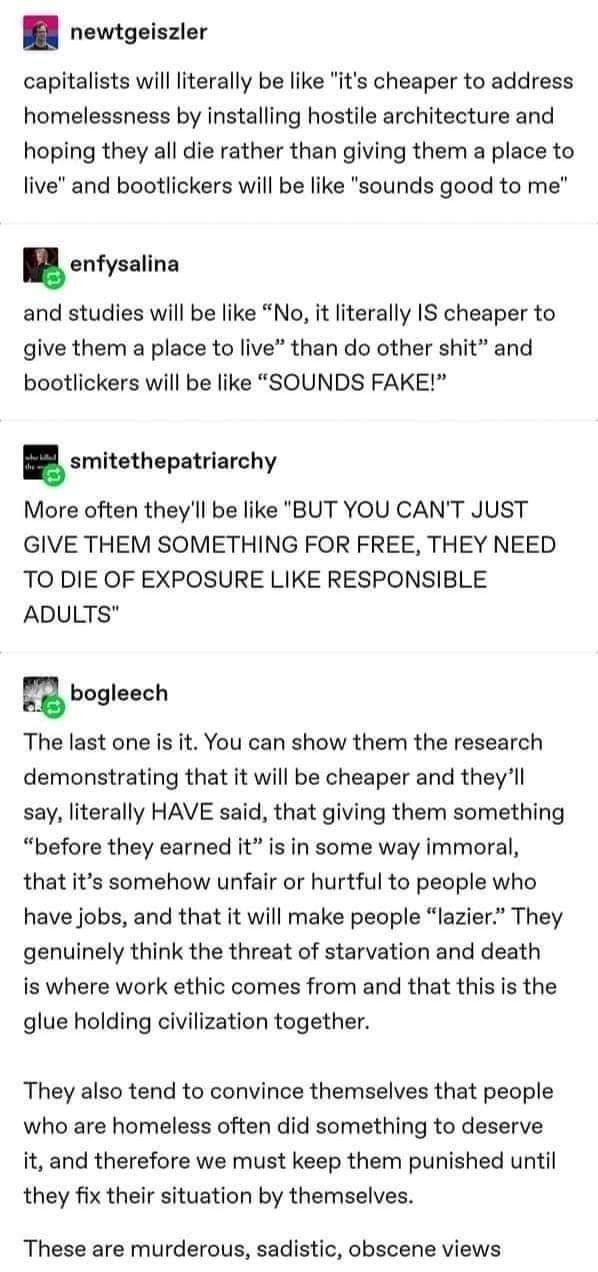
#anarchist#anarchism#anticapitalism#anticapitalist#anti capitalism#anarchy#homelessness#economic inequality#inequality#equality#eat the rich#fuck capitalism
7K notes
·
View notes
Text
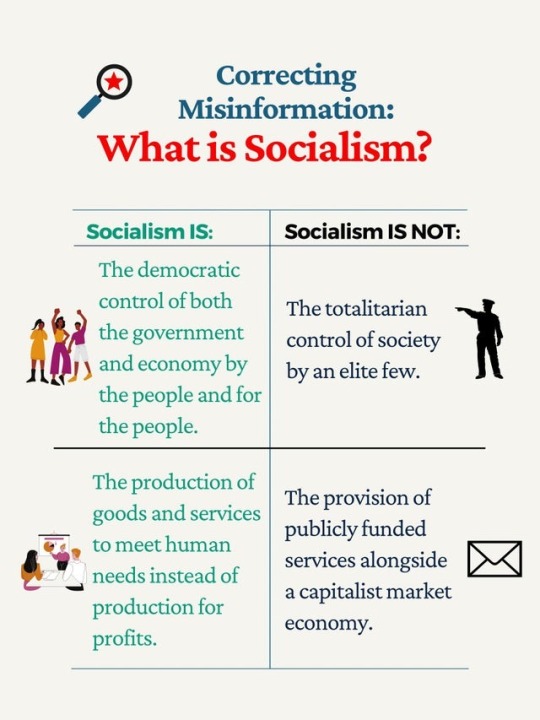


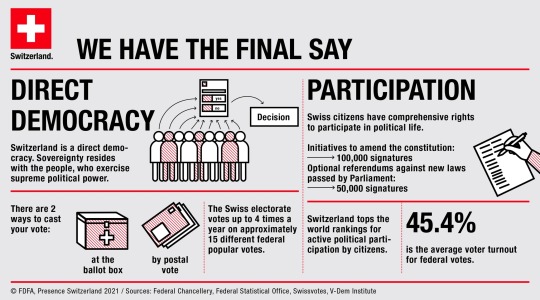
I am a Socialist and I favour Direct Democracy.
1 note
·
View note
Text
Today I gave myself feels thinking about Fang Duobing, Di Feisheng, and Hulijing moving on and aging in a world without Li Lianhua. A world where Li Lianhua isn't there — but then again, he is there, in Lianhualou, and in the townspeople who flock to it, bearing gifts for the miracle doctor who once saved a life, fixed a roof, exposed a conman, comforted a child. Young Fang Duobing used to want to know every little detail about his hero, Li Xiangyi. Now Fang Duobing wants to know every detail about his beloved friend, Li Lianhua. The years pass and fewer people come. But if they remember him, Li Lianhua lives on.
(long post, half meta, half fic, bittersweet)
They travel together, with Hulijing, in Lianhualou. Fang Duobing has nothing better to do, so he takes up detective work again. Di Feisheng has nothing better to do, so he comes along. Everywhere they go, they look for Li Lianhua. And in their journeys, it seems like everywhere they go, someone is talking about Li Xiangyi. Li Xiangyi, who had always been something of a legend, but ever since his reappearance and subsequent (re)disappearance, has seemingly been elevated into something approaching godhood.
you should've seen him, people say, floating across the rooftops in red, cold and beautiful, like an avenging hero out of some novel. wasn't he dead? no — of course he wasn't, li xiangyi would never have been so easily killed. but it was bicha poison, i heard nobody could survive bicha poison. yes, he was definitely dead, and came back to life through dark magic. no, he'd been alive the whole time, just held captive by di feisheng. he tried to kill his shixiong ten years ago and failed, and came back to finish the job. no, his shixiong tried to kill the emperor and li xiangyi came to stop him. the emperor? impossible. yes — don't you know, li xiangyi is the emperor's long-lost son?
All of it only amuses Di Feisheng, but it irks Fang Duobing. The same Fang Duobing, who, when he was younger, would've hungered for every little detail about Li Xiangyi and begged to hear more, now finds it maddening to listen to these strangers talk about him as if they knew him. The world might have known Li Xiangyi, but it had never known Li Lianhua.
Li Lianhua, who could wield Shaoshi like it was a natural extension of his arm, but regularly cut his fingers clumsily slicing radishes and onions. Li Lianhua, who would invariably try to shrug off an attack of bicha poison, but yelped and jumped back from hot oil splatters in the kitchen like a child. Li Lianhua, who frowned when a passing carriage splashed mud onto his robes, but knelt carelessly into the dirt and grass to play with Hulijing.
None of them knew any of that.
But as Fang Duobing and Di Feisheng continue their travels, they begin to encounter other people as well. People who come running when they see Lianhualou in the distance tottering their way. People who come bearing gifts — a woman looking for the shenyi who had helped her with her back pain and also exposed the con artist who had tried to trick her daughter into marriage. A young man coming to thank the doctor who had given his father herbs for stress while uncovering the corrupt official who had falsely accused him of theft. An elderly couple looking for the young man who had helped them thatch their roof before a rainstorm and had given them some medicinal cream before he left. (One middle-aged man with a club, looking for the wangba quack doctor who had exposed his infidelity to his wife — he had left after one look at Di Feisheng, standing silently in the doorway with his arms folded across his chest and dao strapped across his back.) People who greet Hulijing like an old friend.
Fang Duobing listens eagerly to every story they tell him, and in return, he tells them about his brilliant, kind, exasperating friend. Di Feisheng rolls his eyes every time, but Fang Duobing notices he never walks away either. They don't talk about it. But it’s as if Li Lianhua returns, however briefly, during those visits; in those moments, Fang Duobing can almost see him standing there, bending down to pet Hulijing alongside these old friends as she grins her little doggy grin and wags her tail. She escorts their guests to the door, and sits in the doorway after they leave, looking out at the world as though waiting. He doesn't ask if Di Feisheng can see him too. They sit and share wine after these visits, and eat the fruit that the visitors bring, until Di Feisheng can stand the heavy silence no longer and pushes Fang Duobing outside to spar. Hulijing follows faithfully, as always.
(fang duobing had brought home a puppy, once. he can't remember where he found it, but he remembers that he had held it in his lap in his wheelchair, eager to show it to his uncle before taking it home to his mother. his uncle had glared, and told him that dogs were only useful to guard the house, and tianji manor already had guards, human ones, and that fang duobing would do better to focus on his swordplay rather than waste time on such useless and frivolous things. he had taken the puppy away and fang duobing had never seen it again. it wasn't until those blurry months as he rode across the countryside looking for li lianhua, hulijing trotting along ever so loyally at his side, that he realized this was just another way that shan gudao and li xiangyi were opposites.)
The years pass, and there are fewer and fewer people who come. One day Fang Duobing wakes up with the unbearable realization that he is now older than Li Lianhua had ever been, would ever be, and is unable to get out of bed for a good half a shichen. Di Feisheng leaves him be.
The years pass, and Di Feisheng grows older too. There are lines on his face, snowy white beginning to thread through his jet-black hair. Fang Duobing wants very much to tease him about it, but the words catch in his throat when he looks too closely at the signs of time on Di Feisheng's face. What a precious and altogether rare thing it is, to age.
The years pass, and Hulijing grows older too. Fang Duobing finds that more and more often, Hulijing can no longer keep up with him when he goes riding. He stops going riding. She gets cold more easily now too, and more and more often Fang Duobing wakes in the morning with Hulijing curled up under the covers next to him, her wet nose shoved into his armpit. He holds her close and thinks about Li Lianhua shivering in his arms.
--------------------
It's been nearly a year since their last visitor, but today there is an old man. He comes in the morning, bringing a basket of plums. A long time ago, he says, a young man who lived here saved my life. I had been poisoned, he says, by my son who wanted my money and my lands. The doctors said there was no cure. But then the young man came and performed a miracle. He saved my life. He saved my life.
Fang Duobing knows it was no miracle that saved him. He asks for the old man's hand and it is given readily, albeit bemusedly. He presses his fingers to the inside of the man's wrist, and is greeted with a whisper-faint, gentle thrum of yangzhouman — a soft hello from a much-beloved friend. You fool, he thinks dazedly, caught somewhere between overwhelmed that here is someone, inside whom a piece of Li Lianhua lives on, and so bitterly angry. What had it cost? Some hours, days, weeks? He doesn't let himself think of what another week might have afforded them in those wild final days, in their desperate search for a cure. Fang Duobing gives the old man back his hand and blinks back the sting of tears. He cannot talk about Li Lianhua today. He apologizes and tells him that the man he is looking for is traveling and won't be back for a few days, but that Fang-mou will pass on the message. Before he leaves, the man leans down to rub at Hulijing's ear. My old friend, he says, like me, you, too, are truly old now.
After the man leaves, Fang Duobing folds himself into a sit on the floor of Lianhualou and gathers Hulijing into his arms. Gently — her joints are stiff now, and he can't haul her around, can't roughhouse with her the way he used to. Di Feisheng comes down the stairs from where he had been listening; he stands behind Fang Duobing and places a warm, steady hand on his shoulder. At the edge of his vision, near the door, Fang Duobing can see the hazy hem of green robes. If he looks up, he wonders brokenly, what would he see? The face of a man forever frozen in youth? Or a face lined with age, snowy white beginning to thread through jet-black hair? He suddenly finds that he cannot bear to find out.
Fang Duobing knows. He knows that the myth and the outlandish rumors about proud, arrogant, beautiful Li Xiangyi will never die. But he also knows that one day, there will be no one else who comes to Lianhualou; no one left who remembers gentle, sly, infuriating Li Lianhua. One day, the old man will pass on and the piece of Li Lianhua that he carries with him will fade as well. And one day… Fang Duobing presses his forehead against the soft fur of Hulijing's neck where it has gone white and thin with age. He closes his eyes and breathes.
--------------------
Years and years and years later, Fang Duobing is awakened from where he has fallen into a light doze reading in his chair by a soft knock on the door. There is a woman standing outside, holding a small basket of pears. I think I remember this building, she says. I must've only been six years old, but I had run off and lost my parents. I fell down in the street and skinned my knees. A kind gege helped me and gave me a piece of candy. He said he would walk me home but I said I didn't know whether I should tell him where I lived. He laughed and asked if it would help if I knew where he lived. He pointed to the most fantastical and wild house I had ever seen. I think it was this place. Xiansheng, does he live here? Who was he? Do you know him?
Fang Duobing smiles and invites her inside. On the bed, the small white dog that Di Feisheng has named, ridiculously, Baigujing, raises her head and thumps her tail a few times in hello. Di Feisheng looks up from where he is writing a letter at the table. Fang Duobing leads the woman over and waves at her to sit down. He sits across from her, ignoring Di Feisheng's eyeroll, and offers her a piece of candy. He always keeps candy around. Fang Duobing smiles once more and says, if you'd like to know — there is so much I would like to tell you.
#i just... the idea that xiaobao just wants li lianhua to live in any way he can#if he can't live on in reality xiaobao will make damn sure he lives on in someone's memory#something something you die a second death when there is no one left to remember you something something legacy#one day there will only be fang duobing and di feisheng#fang duobing who was li lianhua's friend#and di feisheng who was li xiangyi's equal#but it is not this day#i hurt myself#mysterious lotus casebook#cw: pet death#it's only very vaguely mplied but just in case#my ramblings#how long does transferred inner power stay in someone else's body? *shrug*#that's probably not how the force works#i write economic research for a living why am i suddenly writing mlc fic i haven't written fic in 10 years THE BRAINROT IT IS REAL#in my mind these are simple townspeople not caught up on jianghu things & thus never knew that li lianhua was li xiangyi - whoever that is#baigujing is “white bone spirit” from journey to the west bc i thought di feisheng would find it funny#but did journey to the west even exist yet in lhl time? probably not? IDK i'm uncultured.
46 notes
·
View notes
Text



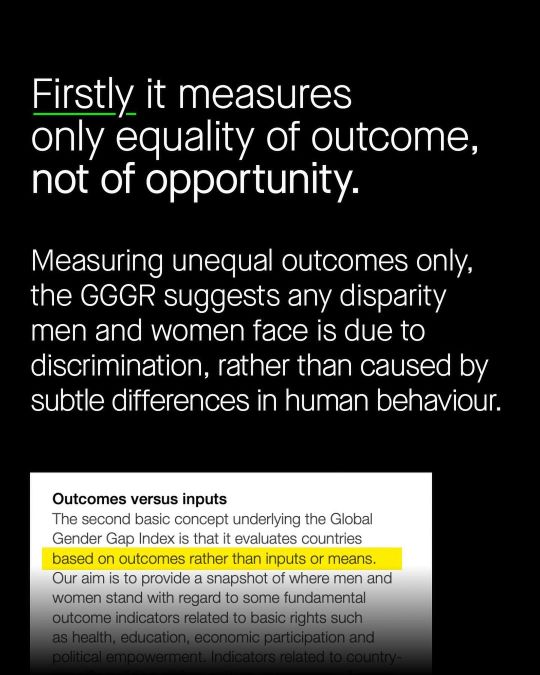
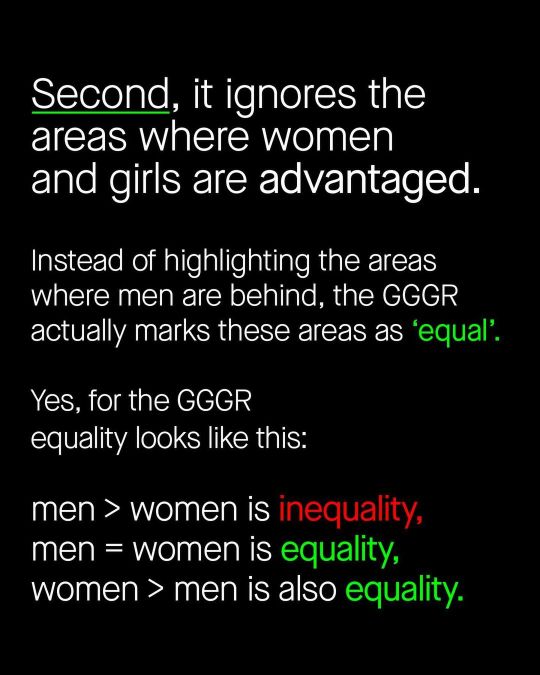


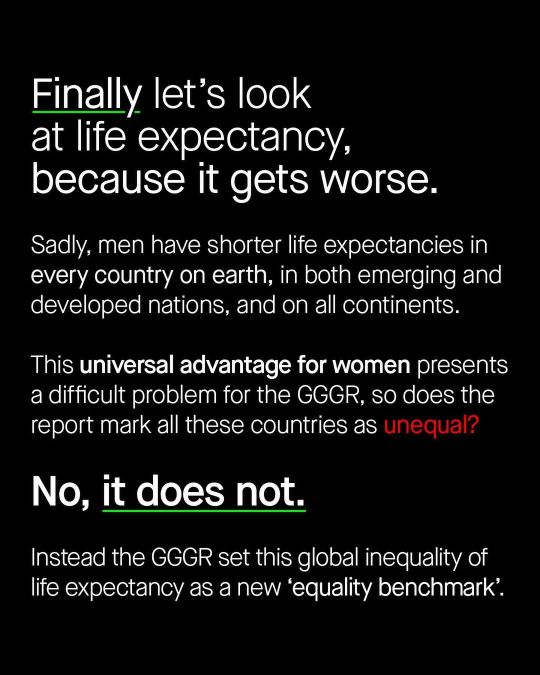
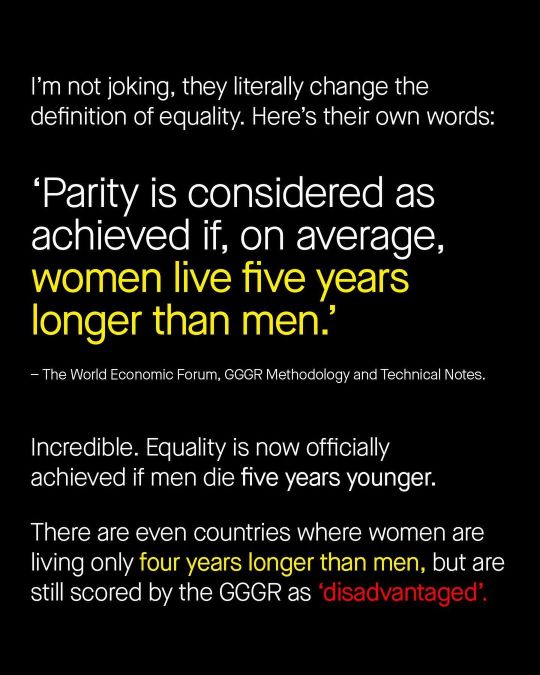
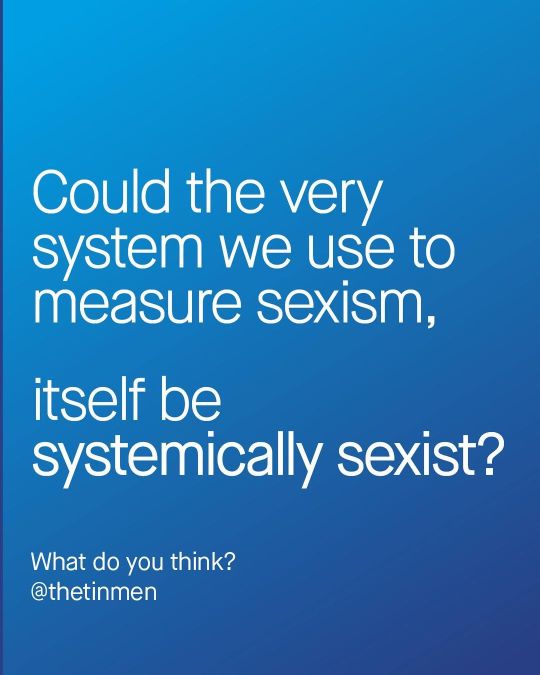
The World Economic Forum is a (self-anointed) global thought leader on politics, sustainability, innovation and equality.
In fact, I actually know the World Economic Forum quite well, I’ve worked with them professionally dozens of times; we’ve collaborated on important projects, we’ve shaken hands, sat around tables and pretended to laugh at each other’s jokes. I’ve even scaled the icy mountains of Switzerland to spend the week documenting the ultra-VIP Davos conference.
Their Global Gender Gap Report is a highly anticipated and respected annual barometer for how the world is doing on its meandering journey toward equality. But with no sense of irony, the report’s methodology is itself, systemically sexist.
So, let’s turn the beady eye of equality onto those pointing the finger, is the GGGR sexist and how?
It’s time to say GG, to the GGGR
Read it for yourself - https://www3.weforum.org/docs/WEF_GGGR_2021.pdf
-
Sources
[1] https://www.theguardian.com/education/2021/aug/13/girls-overtake-boys-in-a-level-and-gcse-maths-so-are-they-smarter
[2] https://www.unodc.org/unodc/en/data-and-analysis/global-study-on-homicide.html
[3] https://www.scielosp.org/article/bwho/2014.v92n8/618-620/en/
[4] https://www.health.harvard.edu/newsletter_article/mars-vs-venus-the-gender-gap-in-health
#The Tin Men#gender equality#equality#inequality#World Economic Forum#Global Gender Gap Report#life expectancy#education#health#misandry#systemic sexism#religion is a mental illness
6 notes
·
View notes
Text
Why we need Land Back
We should talk about current issues Indigenous people face.
In Canada at least there are many problems still happening.
Indigenous children are being ripped away from their loving families and put into foster care simply because the families are poor or the parents struggle with mental illness or something like that.
Women are being forcibly sterilized against their will.
Girls, women, and 2 spirit people are being kidnapped and sold into sex slavery and are also getting murdered and raped and their bodies are being thrown into the landfills.
The land that Indigenous communities need for their cultures and livelihoods is being destroyed by resource extraction companies that cut through the landscape and leave open wounds, that pollute the land, air, and water, and destroy the biodiversity and health of the ecosystems.
There is police brutality against Indigenous people, and people are killed by the police every day. There are hate crimes against Indigenous people.
Social services on reserves, including education, healthcare, utilities, housing, etc, are horrifically underfunded, and are funded much less well than the same social services off of reserves.
There’s discrimination in employment, in healthcare, in pretty much everything. And Indigenous people are kept in poverty and homelessness by the discriminatory society.
We need Land Back.
Land Back will allow Indigenous people to stop their land from being destroyed. Their cultures and livelihoods and mental health and spiritual health and well-being is so deeply tied to the land/nature. And actually, having them be able to effectively protect the land helps all of us because all humans are dependant upon the land even if we don’t realize it.
It will also allow Indigenous communities to force the government to stop discriminating against them by giving them worse social services. It will allow them to force the government to give them the same social services everyone else gets.
It will also allow them to force the government to stop taking their children. All children deserve to be with the families who love them and they should not be ripped away from their families, because this causes deep and devastating lifelong trauma.
It would allow Indigenous communities to stop rapists and traffickers and murderers from entering their communities. It will allow them to force rapists and traffickers and murderers out of their communities. And it will allow them to make sure every case of people getting raped or kidnapped or trafficked or killed is properly investigated and the victims are saved and the perpetrators get justice. Same with other hate crimes.
It will allow Indigenous people to have the power necessary to push back on police brutality and build better models of law enforcement, including community-ventured models.
Indigenous communities will also likely get a flow of money that they can use to lift their people out of poverty.
They’ll have the power to stop healthcare discrimination and forcible sterilization. And they’ll have the power to force us to give justice to unethical healthcare professionals and to force systemic change in the healthcare system so that medical mistreatment doesn’t happen.
Indigenous people would also have the opportunity to do more outreach to settler communities and teach them about Indigenous culture and values and stuff, so that people learn to be less racist and discriminatory.
Land Back will help pretty much every marginalized community because stopping racism and discrimination for one race usually leads to there being decreased racism and discrimination for other races too.
Ultimately Land Back is about giving Indigenous people and communities the power to keep themselves and each other safe in a society that is actively against them. It is also about keeping the ecosystems that we all rely upon safe, and about stopping discrimination and racism.
Giving Indigenous people power to protect themselves and their communities isn’t going to prevent any other community from protecting themselves. It will create more equality and social justice for everyone in Canada.
I support Land Back. I’m a settler girl and I support Land Back, and you should too.
#climate crisis#leftism#left#left wing#leftist#social justice#economic justice#equal rights#equality#racism#racial justice#discrimination#prejudice#racial prejudice#stop prejudice#bipoc lives matter#BIPOC lives matter#indigenous lives matter#indigenous rights#indigenous sovereignty#canadian#canada#canadian politics#cdnpoli#land back#genocide#colonization#colonialism#systemic oppression#systemic inequality
15 notes
·
View notes
Text

LETTERS FROM AN AMERICAN
November 21, 2023
HEATHER COX RICHARDSON
Yesterday the United Auto Workers ratified their new contracts with General Motors, Ford, and Stellantis. The new contracts include wage increases of at least 25% over the next 4.5 years, cost of living increases, union coverage for electric battery plants, and the reopening of a closed plant. “These were just extraordinary wins, especially for those of us who’ve been studying strikes for decades,” Washington University labor expert Jake Rosenfeld told Jeanne Whalen of the Washington Post.
Union president Shawn Fain told Rachel Maddow of MSNBC, “It’s a sign of the times…. In the last 40 years…working class people went backwards continually…. There’s this massive chasm between the billionaire class and the working class and…when those things get out of balance, we need to turn it upside down. When 26 billionaires have as much wealth as half of humanity, that’s a crisis….”
Fain said the automakers strike was “just the beginning…. Now, we take our strike muscle and our fighting spirit to the rest of the industries we represent, and to millions of nonunion workers ready to stand up and fight for a better way of life.”
President Joe Biden, who stood on the picket line with UAW members, congratulated both the auto workers and the companies for their good faith negotiations. “[W]hen unions do well, it lifts all workers,” he said. In the wake of the agreements between the UAW and the Big Three automakers, nonunion automakers who are eager to prevent unionization, including Toyota, Honda, Hyundai, Nissan, and Subaru, also announced wage increases.
Following a tradition normalized in the 1980s, Biden also pardoned the turkeys Liberty and Bell yesterday, marking the unofficial start of the holiday season. The birds will move to the University of Minnesota’s College of Food, Agricultural and Natural Resource Sciences where they will become educational ambassadors for a state where turkey production provides more than $1 billion in economic activity and more than 26,000 jobs.
At the ceremony, Biden urged people to “give thanks for the gift that is our nation.” He offered special thanks to service members, with whom he and First Lady Jill Biden shared a Friendsgiving meal on Sunday.
Falling prices for travel and for the foods usually on a Thanksgiving table are news the White House is celebrating. Gas prices have dropped an average of $1.70 from their peak, airfares are down 13%, and car rental prices are down about 10% over the past year.
According to the American Farm Bureau, the price of an average Thanksgiving dinner has dropped by 4.5%. The cost of turkeys has dropped more than 5% from last year, when an avian flu epidemic meant nearly 58 million birds were slaughtered (this year, growers have lost about 4.6 million birds to the same cause). Whipping cream, cranberries, and pie crust have also dropped in price.
But plenty of grocery prices are still rising, and Senator Bob Casey (D-PA) has taken on the issue, documenting how “corporations are making record profits on the backs of American families.” In a public report, Casey noted that from July 2020 through July 2022, inflation rose by 14%, but corporate profits rose by 75%, five times as fast. A family making $68,000 a year in 2022 paid $6,740 in that period to “corporate executives and wealthy shareholders.�� In 2023, that amount will be at least $3,546.
The report notes that the cost for chicken went up 20% in 2021 as Tyson Foods doubled their profits from the first quarter of 2021 to the first quarter of 2022; Tyson has been ordered to pay hundreds of millions of dollars in penalties and restitution for “illegally conspiring to inflate chicken prices.” PepsiCo’s chief financial officer said in April 2023 that even though inflation was dropping, their prices would not. He said “consumers generally look at our products and say ‘you know what—they are worth paying a little bit more for.’”
President Biden has launched a campaign to push back on corporate profiteering, including cracking down on the practice of so-called junk fees—unexpected hidden costs for air travel, car rentals, credit cards, cable television, ticket sales, and so on. (The airline industry collected more than $6.7 billion last year in baggage fees, for example.)
But Tony Romm of the Washington Post explained on Sunday that corporate lobbyists are warring with the Biden administration to stop the crackdown. An airline lobbyist testified at a federal hearing in March that changing the policy would create “confusion and frustration” and that there have been “very few complaints” about the extra costs for bags. The same lobbying group told the Department of Transportation that the government had no data to “demonstrate substantial harm” to passengers. A lobbying group for advertising platforms including Facebook and Google agreed that the Federal Trade Commission had failed to present “sufficient empirical evidence” that junk fees are a problem.
Much of the fight over the relative power of ordinary Americans and corporations will play out in the courts. Those courts are themselves struggling over the role of money in their deliberations. After scandals in which it has become clear that Supreme Court justices—primarily Clarence Thomas and Samuel Alito, but a real estate deal of Neil Gorsuch’s has also been questioned—have accepted gifts from exceedingly wealthy Republican donors, the court on November 13 finally issued its own ethics guidelines.
That code of conduct echoes the obligations of judges in the rest of the U.S. court system, but it takes away the requirements for behavior imposed on the lower courts, and—crucially—it has no methods of enforcement. Legal analyst Dahlia Lithwick noted that the code appeared to be designed to assure the American people they were confused about the need for an ethics code. It appeared, Lithwick said, to be “principally drafted with the intention of instructing us that they still can’t be made to do anything.”
The Supreme Court has been packed with lawyers from the Federalist Society, established in the 1980s to push back on what its members believed was the judicial activism of federal judges who used the Fourteenth Amendment to defend civil rights in the states. Federalist Society lawyers were key to creating legal excuses for Trump to overturn the lawful results of the 2020 presidential election, and yet the society has never addressed how their people have turned into such extremists.
In the New York Times today, leading former Federalist Society lawyer George Conway, former judge J. Michael Luttig, and former representative Barbara Comstock (R-VA) called out both the Federalist Society for failing to respond to the crisis Trump represents, and “the growing crowd of grifters, frauds and con men willing to subvert the Constitution and long-established constitutional principles for the whims of political expediency.”
They announced a new organization to replace the corrupted Federalist Society, a significant move considering how entrenched that society has become in our justice system. The Society for the Rule of Law Institute, made up of conservative lawyers, will be “committed to the foundational constitutional principles we once all agreed upon: the primacy of American democracy, the sanctity of the Constitution and the rule of law, the independence of the courts, the inviolability of elections and mutual support among those tasked with the solemn responsibility of enforcing the laws of the United States.” The authors say that the new organization will provide a conservative voice for democracy and that they hope to work with much more deeply established progressive voices.
For now, the Biden administration continues to try to rebalance the economic playing field. Today the Treasury Department announced the largest settlements in history for violations of U.S. anti–money laundering laws and sanctions. Cryptocurrency giant Binance, which handles about 60% of the world’s virtual currency trading, settled over violations in transactions that laundered money for terrorists—including Hamas, Islamic Jihad, Al Qaeda, and ISIS—and other criminals, and violating sanctions, including those against Iran, North Korea, Syria, and the occupied Crimean region of Ukraine.
Binance will pay more than $4 billion in fines and penalties.
At the same time, the Justice Department obtained a guilty plea from Binance chief executive officer Changpeng Zhao, a Canadian national, for failing to maintain an effective anti–money laundering program. Zhao amassed more than $23 billion at the head of the company; he will pay $200 million in fines and step down. He could face as much as 10 years in prison, but his sentence will likely be less than 18 months.
U.S. officials say this is the biggest-ever corporate resolution that includes criminal charges for an executive.
—
LETTERS FROM AN AMERICAN
HEATHER COX RICHARDSON
#the economy#UAW#federalist society#Letters From An American#Heather Cox Richardson#economic equality#working class#paycheck to paycheck
1 note
·
View note
Text
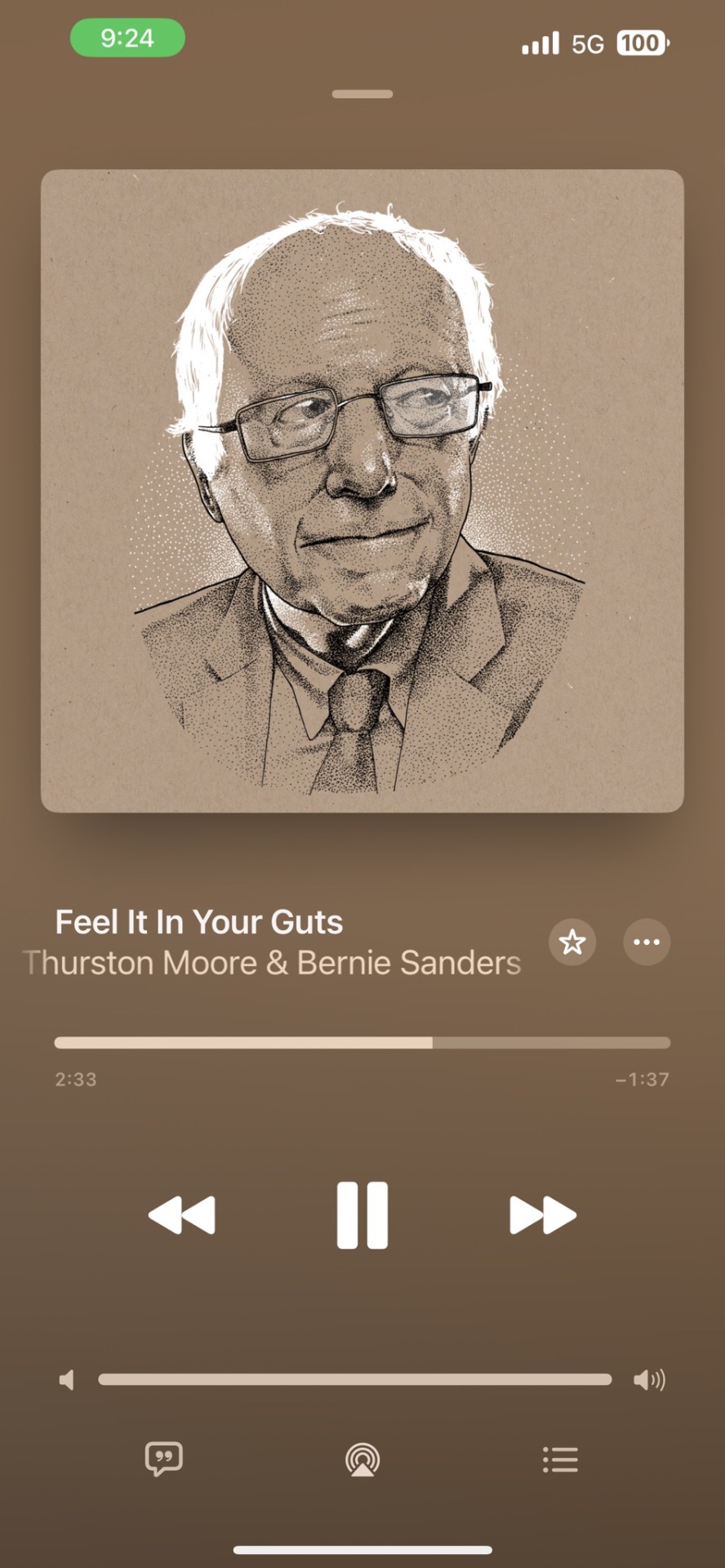
💙
1 note
·
View note
Text
Martin Luther King Jr. Dream Was A Lil Different Than How Y’all Try To Portray It | The G.A.B.
Full Show On The YouTube (Kamal Johnson Network). Link Below
YT Link
https://youtu.be/JBnCUpPeqpU?si=kaIJW_Tzw77BgYLT via YouTube
Podcast Links
iHeart: https://www.iheart.com/podcast/338-the-gab-101916901/episode/martin-luther-king-jr-dream-was-143505420/
Spotify: https://open.spotify.com/episode/2H8H1VrWPjZutaJzPIEjc6?si=5662ba1a0ba54b51
Apple Podcast: https://podcasts.apple.com/us/podcast/the-g-a-b/id1547660066?i=1000641918180
Podpage: https://www.podpage.com/the-gab/
@youtube @revolttv @bet @foxnews @npr @nbcnews @cbsnews-blog @kusinews @starz @hbomaxes @showtimenetworks @hulu @twitch @msnbc @kpbs @vicemag @abcnews @cnnpolitics @pbs
#martin luther king jr#economics#reparations#equality#economic equality#mlk day#mlk#jokes#lol#comedy#funny#fyp#for your page#black twitter#white people#black people#black excellence#black show#black podcast#black owned#twitch#youtube channel#comedy videos#funny videos#viral video#black news channel#news#news update#news show
0 notes
Text
I need to move this from my "to read" list to my "have read" list (like over 50 other damn things) but this tweet had me thinking about the coining of amatonormativity again, which was done in Minimizing Marriage: Marriage, Morality, and the Law by Elizabeth Brake.
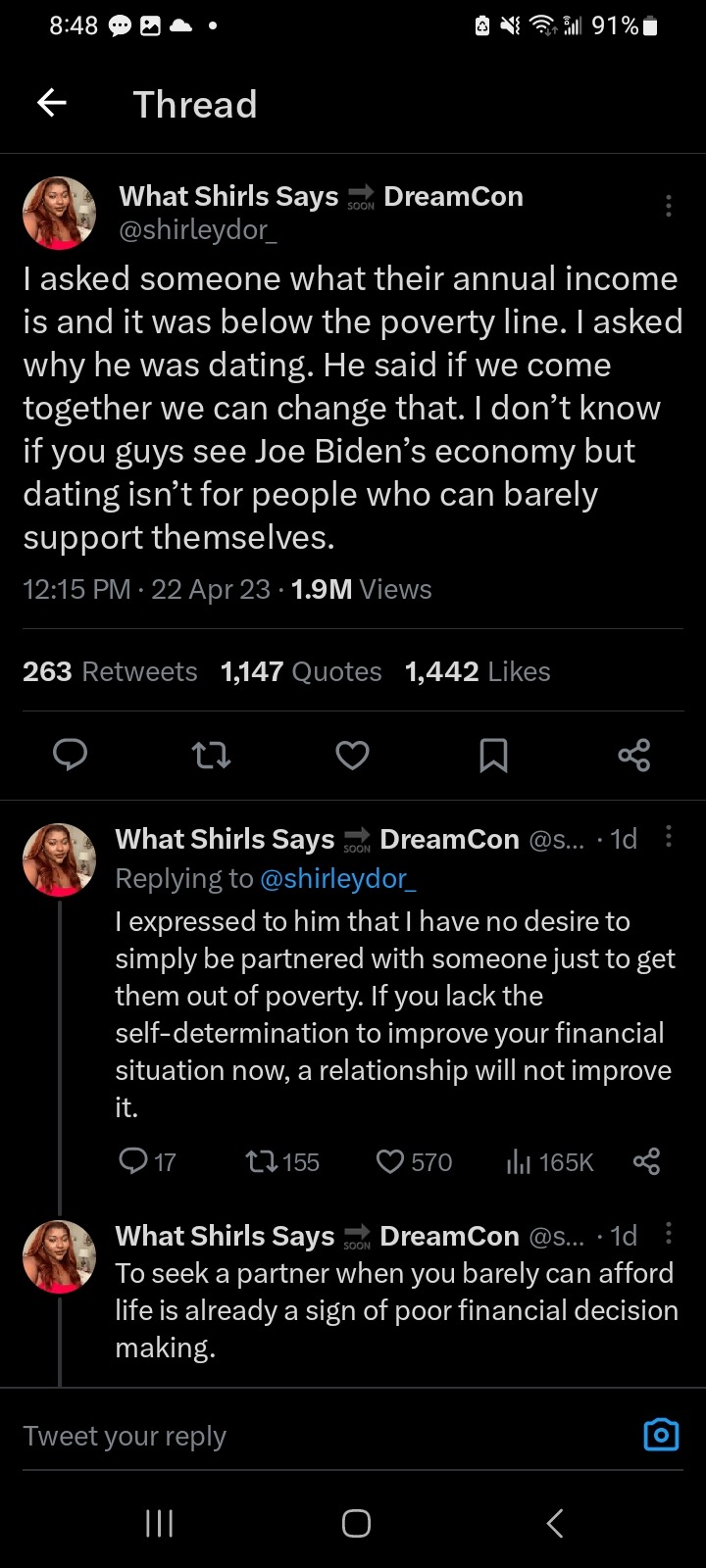
I realize tumblr is brain poisoned as fuck about this still, given that I believe I saw a post calling amatonormativity "rape apologia" as recently as 2020, but part of why this tweet is fucking stupid is that being in a relationship is smart economic sense, has been for a very long time, and Minimizing Marriage actually... discusses this.
Even living together without papers is economically beneficial. Rent is priced above a third of a lot of people's income. Two people's income, however... and of course, we're all familiar with the "getting married for tax benefits" joke. The only people for whom it's not economically beneficial to have a partner/be married in Biden's economy are the disabled, because the law specifically punishes you if you're on benefits for being married, because of eugenics.
Marriage itself is in large part a matter of finances. You're creating a unit which has joint finances, and historically your family would benefit economically from marrying off their kids (dowries/dowers/bride prices, and not needing to provide for as many people, and I'll note here that this is still true of many families today).
To underscore this: I recently saw an anecdote that this is part of why child marriage occurs in the US and Canada. Now, I did not see this person link academic or journalistic discussion about this aspect specifically, but I'm inclined to believe it.
The flip side of this tweet as well is that the OP is basically saying "the less you live the more you can work, and some people do not deserve to live" like it's a good thing, and someone replied to her stating that sentiment even more clearly, which immediately brought to mind this quote by Marx- "The less you eat, drink, buy books, go to the theatre or to balls, or to the pub, and the less you think, love, theorize, sing, paint, fence, etc., the more you will be able to save and the greater will become your treasure which neither moth nor rust will corrupt—your capital. The less you are, the less you express your life, the more you have, the greater is your alienated life and the greater is the saving of your alienated being." This sentiment compounds with the fact that discouraging the poor (who often overlap with the disabled, the racialized lessers, the queer, etc) from having relationships, families, and/or children, is again, part of eugenics.
#Cipher talk#amatonormativity#The fight for marriage is and was a fight for economic equality (disabled people still haven't won that right in the US)#The fight against marriage and the family and a dozen other things related to this is the fight to destroy these kinds of economic#Pressures and bonds that necessarily exclude people from having full status and full protection in society#Socially and economically#Not to destroy family or committed relationships but to destroy the bludgeoning they can be used for in presence or absence
37 notes
·
View notes
Text
AN OPEN LETTER to THE U.S. CONGRESS
Put the Good Jobs for Good Airports standards in the FAA reauthorization bill!
104 so far! Help us get to 250 signers!
I’m calling on you to stand with working people, passengers and our communities by supporting Good Jobs for Good Airports standards (GJGA) in the FAA reauthorization bill. Airports should and can be strong, vibrant drivers of good jobs in every part of our country. The Good Jobs for Good Airports standards are central to that mission and our nation’s future prosperity. Billions of our public dollars are invested in our nation’s aviation system every year, and we must ensure that our public resources serve the public good. That includes ensuring airports better serve the needs of our families, our passengers, our communities and the airport service workers who make it all possible.
It is evident that our air travel industry is in crisis. From record flight cancellations during summer travel peaks to mountains of lost luggage during the holiday travel season. Airports are critical publicly-funded infrastructure vital to the health of our local communities and global economy, but right now airports aren't working the way they should for travelers or airport service workers — a largely Black, brown, multiracial and immigrant service workforce. These working people, including cleaners, wheelchair agents, baggage handlers, concessionaires and ramp workers, keep airports safe and running smoothly even through a global pandemic, climate disasters and busy travel seasons. Yet many are underpaid and underprotected--even as some major airlines rake in record profit and billions of our tax dollars are invested in our national air travel system.
Domestic passenger numbers increased by 80% between 2020 and 2021, total industry employment fell by nearly 14%, leaving airport service workers to sometimes clean entire airplanes in as little as five minutes as many take on additional responsibilities outside of their typical job duties. Meanwhile, wages have barely budged for airport service workers in 20 years. The Good Jobs for Good Airports standards has the power to transform workers’ lives by ensuring airport service workers have the pay and benefits they need to care for their families.
The Good Jobs for Good Airports standards would help build a stronger, safer, more resilient air travel industry by making airport service jobs good jobs with living wages and benefits like affordable healthcare for all airport workers. Airport service workers at more than 130 covered airports would be supported through established wage and benefit standards, putting money back into hundreds of local economies and helping families thrive. If passed over 73% of wage increases will go to workers making $20 or less, estimates show.
I urge you to include the Good Jobs for Good Airports standards in the FAA reauthorization bill, and help ensure our public money serves the public good.
▶ Created on September 20, 2023 by Jess Craven
📱 Text SIGN PNXUOF to 50409
🤯 Liked it? Text FOLLOW JESSCRAVEN101 to 50409
#JESSCRAVEN101#PNXUOF#resistbot#FAA reauthorization#Good Jobs for Good Airports#airport workers#aviation industry#public infrastructure#labor rights#economic justice#workers' rights#fair wages#benefits#community support#passenger rights#public investment#economic prosperity#airport service workers#living wages#healthcare#job security#labor standards#economic equity#social welfare#income equality#workplace conditions#economic development#local economies#financial stability#worker empowerment
5 notes
·
View notes